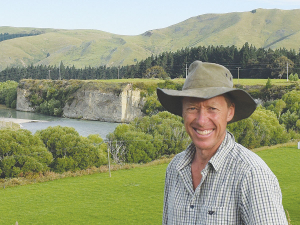94% of NZ farmers oppose Paris Agreement, survey shows
A survey of 2000 farmers shows 94% of respondents believe that remaining in the Paris Agreement for climate change is not in the country's best interest.
 Jamie McFadden believes the Government's policy on FEPs is unprecedented state control over ordinary citizens.
Jamie McFadden believes the Government's policy on FEPs is unprecedented state control over ordinary citizens.
Rural Advocacy Network chairman Jamie McFadden was a key speaker at the recent round of Groundswell NZ meetings. He spoke about the push for Farm Environment Plans (FEPs) and why these may not be the great cure-all many are claiming. Here is an edited version of the speech...
There are many different approaches to farm plans.
Taranaki Regional Council has, over the past 25 years, continued the catchment board approach to voluntary farm plans working in partnership with farmers. In Canterbury, ECan has taken a one-size-fits-all, tick box regulatory approach to farm plans. There are also a myriad of industry farm plan templates. An actions-focused, empowering farm plan is very different to the one the Government is mandating through the Resource Management Act (RMA).
Under New Zealand law we are supposed to be protected from unjustified state control. The Government is enforcing mandatory, certified, audited FEPs on every farmer - regardless of whether there is a freshwater issue in your catchment or whether your activity is having more than minor effect on the environment.
The only group of people being subject to mandatory environment plans are farmers. If the Government were being consistent then they would require everyone (including urban landowners) to do an Environment Plan as we all affect freshwater. But imagine the howls of protest against state control.
The Government claims that farmers need to do these FEPs to reassure our overseas markets. However, the RMA is related to environmental effects, not issues of market assurance. The Government is using this argument because it insufficient justification under the RMA.
Market assurance should be progressed through out industry and exporters, which is already happening with meat companies, Fonterra and industry groups.
The Government has attempted to sell their mandatory FEP policy with a $50 million sweetener and the promise (just prior to the election) of reducing compliance for every farmer. This misleading claim of reducing compliance ignores some facts.
A market assurance farm plan through your meat or milk company or industry group like Beef+Lamb NZ is confidential. None of your private property information is available to the public unless you require a consent or get caught in a compliance issue or for mapping the likes of Significant Natural Area's (SNA), but it is only information related to that specific issue.
However, when an FEP becomes compliance under the RMA it becomes public information. So, all that information on a dryland farm that was previously not accessible to the public now becomes public.
This represents a major breach of people's privacy rights.
It is for all these reasons we should reject the Government's legislation on RMA-mandated FEPs and call on all farmers to refuse to comply until such time the issues outlined above are resolved.
Horticulture New Zealand (HortNZ) has added its perspective to numerous primary sector voices urging the Government to strengthen its draft legislation to replace the Resource Management Act (RMA).
The Commerce Commission has finalised new information disclosure requirements for local councils and water organisations that deliver water supply and wastewater services.
Beef + Lamb NZ (B+LNZ) is calling for significant changes to the Government’s reforms to the Resource Management Act (RMA).
NZPork says the Government needs to strengthen its proposed planning laws to ensure New Zealand's pig farmers can continue to produce pork.
Good news for kiwifruit growers - a record crop with forecast per hectare returns at record levels for all fruit categories for the 2025-26 season.
As guests gathered on what is known as the Speaker's Lawn - a beautifully manicured patch of grass behind the main buildings of Parliament - to mingle and enjoy a lamb chop to celebrate National Lamb Day, the mood was very much upbeat.

OPINION: The proverbial has really hit the fan in Wellington and exposed a glaring example of a double standard in…
OPINION: Dark suited spin doctors exist to, well, spin, and the nice cuddly progressive types at Greenpeace Aotearoa practice this…